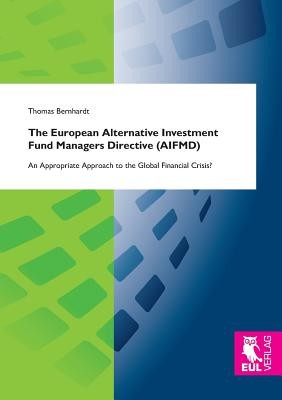
- We will send in 10–14 business days.
- Author: Thomas Bernhardt
- Publisher: Josef Eul Verlag GmbH
- Year: 2013
- Pages: 228
- ISBN-10: 384410285X
- ISBN-13: 9783844102857
- Format: 14.8 x 21 x 1.2 cm, softcover
- Language: English
- SAVE -10% with code: EXTRA
The European Alternative Investment Fund Managers Directive (Aifmd) (e-book) (used book) | bookbook.eu
Reviews
Description
The European Alternative Investment Fund Managers Directive (AIFMD) has been formulated as a response to the global financial crisis, which climaxed in the collapse of Lehman Brothers on 15 September 2008. The securitisation of real estate risks that came about by launching financial innovations such as asset-backed securities (ABS), mortgage-backed securities (MBS), collateralised debt obligations (CDO) or structured investment vehicles (SIV) contributed particularly to the fast worldwide circulation of 'poisoned' papers. Assuming that the financial crisis of 2008/2009 was the consequence of wrongfully set incentives that primarily concerned the fund managers' remuneration, the European Commission followed the ideas of Jacques de Larosière, Klaus-Heiner Lehne and Poul Nyrup Rasmussen and set the legal focus on the fund managers, as these entities launch and distribute financial products such as those mentioned above and also decide on the investment strategy that might bear systemic risks. Due to their financial market potential and in view of the design of financial products, these entities admittedly have a strong impact on the financial market development and may jointly be responsible for the realisation of systemic risks of transnational dimensions. In particular, in the view of a steady credit supply of the real economy, the enormous transnational mobility of capital and the global competition of financial market regulations, it seems doubtful whether one can identify the fund managers as those responsible for the financial market crisis of 2008/2009. This thesis highlights the history, symptoms and supposed core reasons of the financial crisis of 2008/2009 and critically assesses whether the AIFMD can reach its objective to effectively contain systemic risks in the context of a globalised financial system.
EXTRA 10 % discount with code: EXTRA
The promotion ends in 21d.00:33:56
The discount code is valid when purchasing from 10 €. Discounts do not stack.
- Author: Thomas Bernhardt
- Publisher: Josef Eul Verlag GmbH
- Year: 2013
- Pages: 228
- ISBN-10: 384410285X
- ISBN-13: 9783844102857
- Format: 14.8 x 21 x 1.2 cm, softcover
- Language: English English
The European Alternative Investment Fund Managers Directive (AIFMD) has been formulated as a response to the global financial crisis, which climaxed in the collapse of Lehman Brothers on 15 September 2008. The securitisation of real estate risks that came about by launching financial innovations such as asset-backed securities (ABS), mortgage-backed securities (MBS), collateralised debt obligations (CDO) or structured investment vehicles (SIV) contributed particularly to the fast worldwide circulation of 'poisoned' papers. Assuming that the financial crisis of 2008/2009 was the consequence of wrongfully set incentives that primarily concerned the fund managers' remuneration, the European Commission followed the ideas of Jacques de Larosière, Klaus-Heiner Lehne and Poul Nyrup Rasmussen and set the legal focus on the fund managers, as these entities launch and distribute financial products such as those mentioned above and also decide on the investment strategy that might bear systemic risks. Due to their financial market potential and in view of the design of financial products, these entities admittedly have a strong impact on the financial market development and may jointly be responsible for the realisation of systemic risks of transnational dimensions. In particular, in the view of a steady credit supply of the real economy, the enormous transnational mobility of capital and the global competition of financial market regulations, it seems doubtful whether one can identify the fund managers as those responsible for the financial market crisis of 2008/2009. This thesis highlights the history, symptoms and supposed core reasons of the financial crisis of 2008/2009 and critically assesses whether the AIFMD can reach its objective to effectively contain systemic risks in the context of a globalised financial system.


Reviews